Hotel Revenue Management - Assignment
VerifiedAdded on 2021/02/03
|8
|2856
|355
AI Summary
Contribute Materials
Your contribution can guide someone’s learning journey. Share your
documents today.
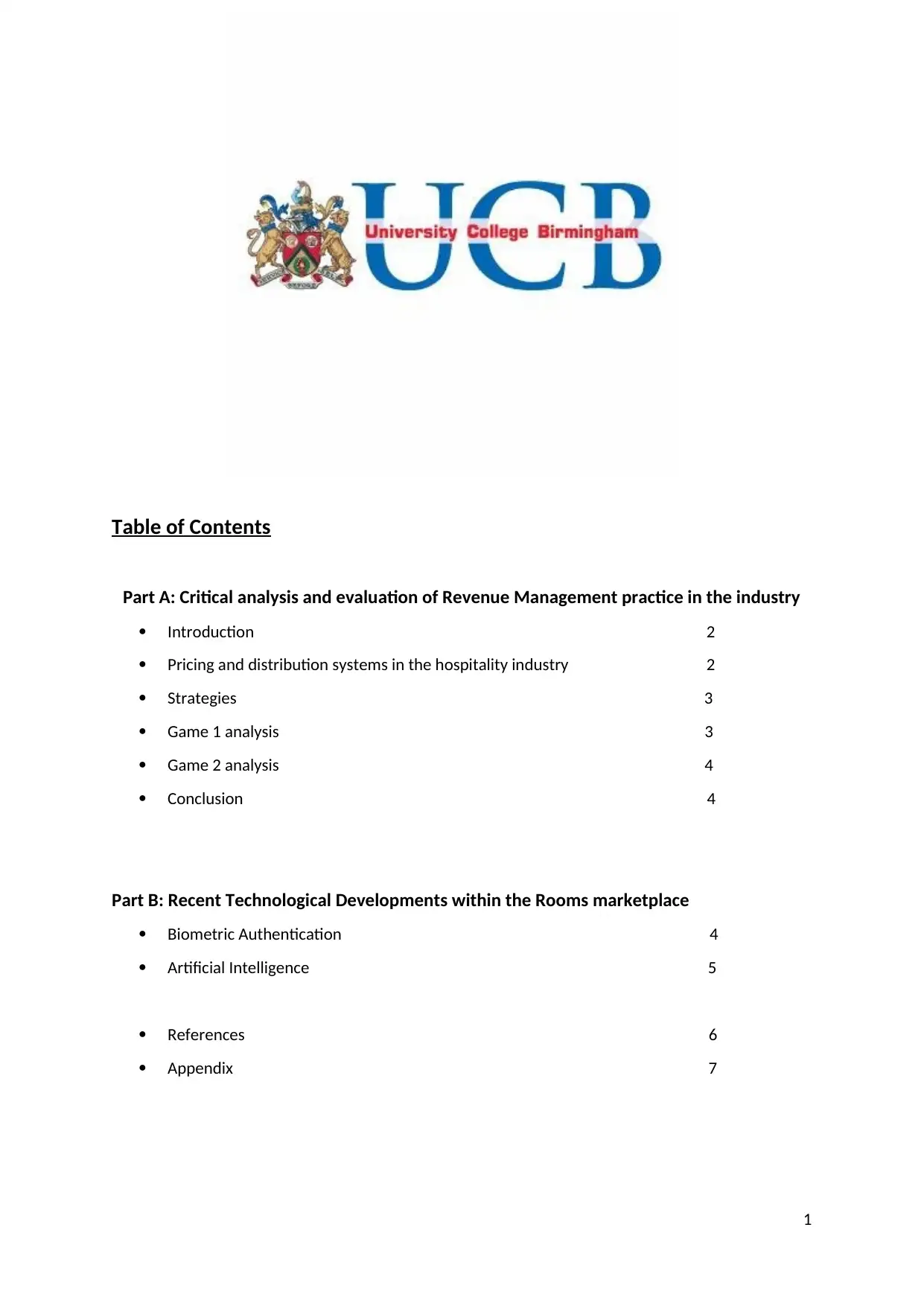
Table of Contents
Part A: Critical analysis and evaluation of Revenue Management practice in the industry
Introduction 2
Pricing and distribution systems in the hospitality industry 2
Strategies 3
Game 1 analysis 3
Game 2 analysis 4
Conclusion 4
Part B: Recent Technological Developments within the Rooms marketplace
Biometric Authentication 4
Artificial Intelligence 5
References 6
Appendix 7
1
Part A: Critical analysis and evaluation of Revenue Management practice in the industry
Introduction 2
Pricing and distribution systems in the hospitality industry 2
Strategies 3
Game 1 analysis 3
Game 2 analysis 4
Conclusion 4
Part B: Recent Technological Developments within the Rooms marketplace
Biometric Authentication 4
Artificial Intelligence 5
References 6
Appendix 7
1
Secure Best Marks with AI Grader
Need help grading? Try our AI Grader for instant feedback on your assignments.
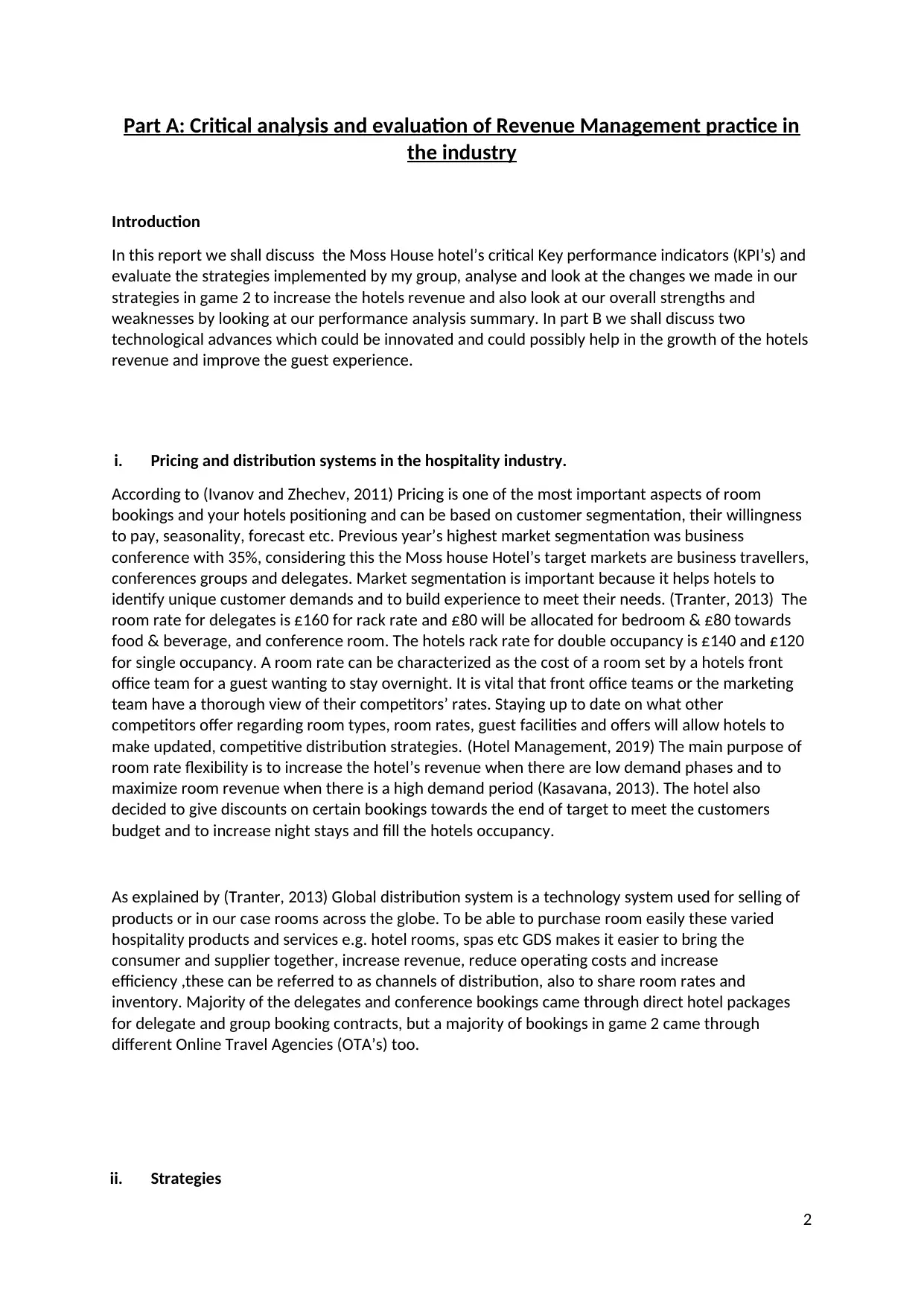
Part A: Critical analysis and evaluation of Revenue Management practice in
the industry
Introduction
In this report we shall discuss the Moss House hotel’s critical Key performance indicators (KPI’s) and
evaluate the strategies implemented by my group, analyse and look at the changes we made in our
strategies in game 2 to increase the hotels revenue and also look at our overall strengths and
weaknesses by looking at our performance analysis summary. In part B we shall discuss two
technological advances which could be innovated and could possibly help in the growth of the hotels
revenue and improve the guest experience.
i. Pricing and distribution systems in the hospitality industry.
According to (Ivanov and Zhechev, 2011) Pricing is one of the most important aspects of room
bookings and your hotels positioning and can be based on customer segmentation, their willingness
to pay, seasonality, forecast etc. Previous year’s highest market segmentation was business
conference with 35%, considering this the Moss house Hotel’s target markets are business travellers,
conferences groups and delegates. Market segmentation is important because it helps hotels to
identify unique customer demands and to build experience to meet their needs. (Tranter, 2013) The
room rate for delegates is £160 for rack rate and £80 will be allocated for bedroom & £80 towards
food & beverage, and conference room. The hotels rack rate for double occupancy is £140 and £120
for single occupancy. A room rate can be characterized as the cost of a room set by a hotels front
office team for a guest wanting to stay overnight. It is vital that front office teams or the marketing
team have a thorough view of their competitors’ rates. Staying up to date on what other
competitors offer regarding room types, room rates, guest facilities and offers will allow hotels to
make updated, competitive distribution strategies. (Hotel Management, 2019) The main purpose of
room rate flexibility is to increase the hotel’s revenue when there are low demand phases and to
maximize room revenue when there is a high demand period (Kasavana, 2013). The hotel also
decided to give discounts on certain bookings towards the end of target to meet the customers
budget and to increase night stays and fill the hotels occupancy.
As explained by (Tranter, 2013) Global distribution system is a technology system used for selling of
products or in our case rooms across the globe. To be able to purchase room easily these varied
hospitality products and services e.g. hotel rooms, spas etc GDS makes it easier to bring the
consumer and supplier together, increase revenue, reduce operating costs and increase
efficiency ,these can be referred to as channels of distribution, also to share room rates and
inventory. Majority of the delegates and conference bookings came through direct hotel packages
for delegate and group booking contracts, but a majority of bookings in game 2 came through
different Online Travel Agencies (OTA’s) too.
ii. Strategies
2
the industry
Introduction
In this report we shall discuss the Moss House hotel’s critical Key performance indicators (KPI’s) and
evaluate the strategies implemented by my group, analyse and look at the changes we made in our
strategies in game 2 to increase the hotels revenue and also look at our overall strengths and
weaknesses by looking at our performance analysis summary. In part B we shall discuss two
technological advances which could be innovated and could possibly help in the growth of the hotels
revenue and improve the guest experience.
i. Pricing and distribution systems in the hospitality industry.
According to (Ivanov and Zhechev, 2011) Pricing is one of the most important aspects of room
bookings and your hotels positioning and can be based on customer segmentation, their willingness
to pay, seasonality, forecast etc. Previous year’s highest market segmentation was business
conference with 35%, considering this the Moss house Hotel’s target markets are business travellers,
conferences groups and delegates. Market segmentation is important because it helps hotels to
identify unique customer demands and to build experience to meet their needs. (Tranter, 2013) The
room rate for delegates is £160 for rack rate and £80 will be allocated for bedroom & £80 towards
food & beverage, and conference room. The hotels rack rate for double occupancy is £140 and £120
for single occupancy. A room rate can be characterized as the cost of a room set by a hotels front
office team for a guest wanting to stay overnight. It is vital that front office teams or the marketing
team have a thorough view of their competitors’ rates. Staying up to date on what other
competitors offer regarding room types, room rates, guest facilities and offers will allow hotels to
make updated, competitive distribution strategies. (Hotel Management, 2019) The main purpose of
room rate flexibility is to increase the hotel’s revenue when there are low demand phases and to
maximize room revenue when there is a high demand period (Kasavana, 2013). The hotel also
decided to give discounts on certain bookings towards the end of target to meet the customers
budget and to increase night stays and fill the hotels occupancy.
As explained by (Tranter, 2013) Global distribution system is a technology system used for selling of
products or in our case rooms across the globe. To be able to purchase room easily these varied
hospitality products and services e.g. hotel rooms, spas etc GDS makes it easier to bring the
consumer and supplier together, increase revenue, reduce operating costs and increase
efficiency ,these can be referred to as channels of distribution, also to share room rates and
inventory. Majority of the delegates and conference bookings came through direct hotel packages
for delegate and group booking contracts, but a majority of bookings in game 2 came through
different Online Travel Agencies (OTA’s) too.
ii. Strategies
2
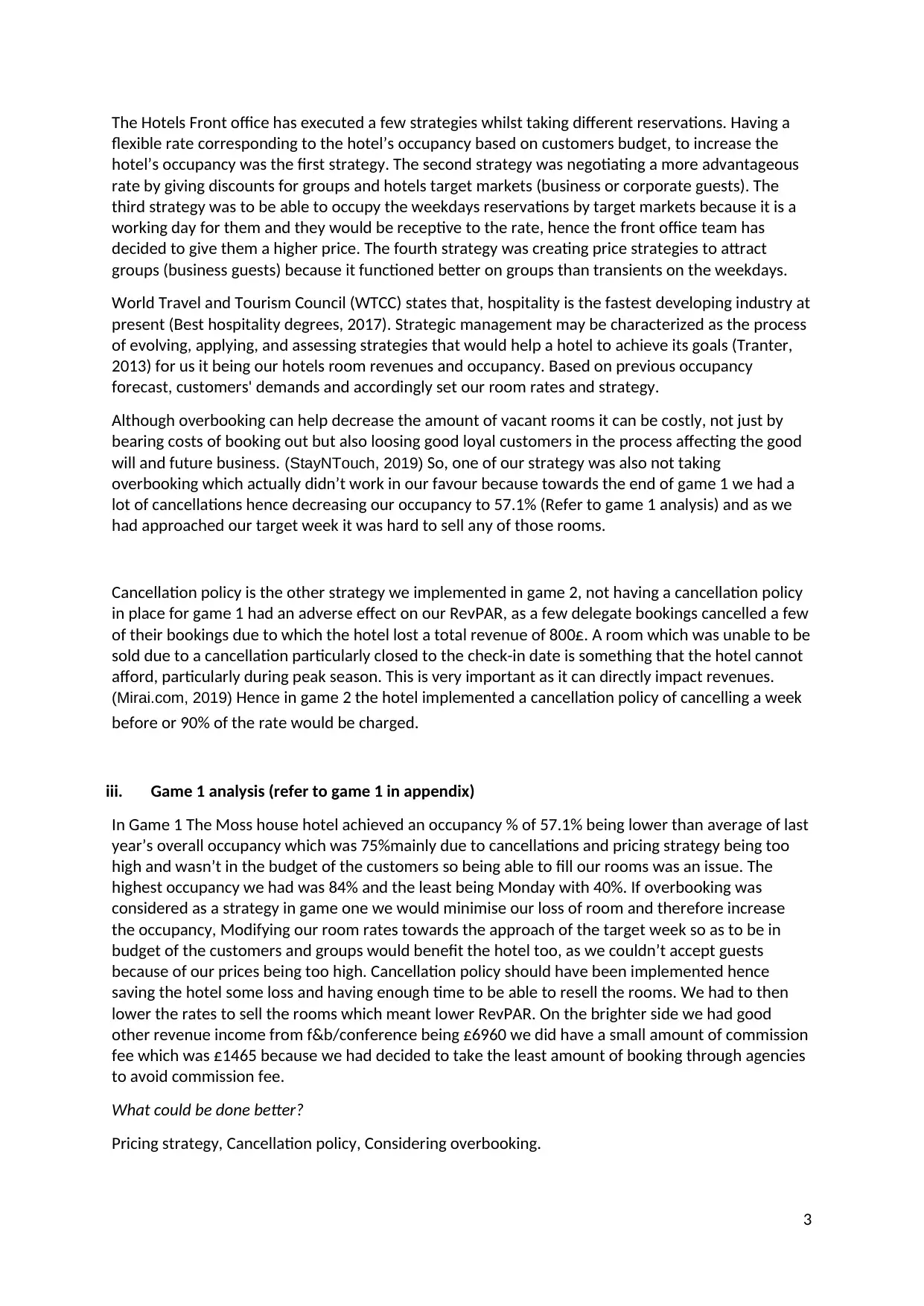
The Hotels Front office has executed a few strategies whilst taking different reservations. Having a
flexible rate corresponding to the hotel’s occupancy based on customers budget, to increase the
hotel’s occupancy was the first strategy. The second strategy was negotiating a more advantageous
rate by giving discounts for groups and hotels target markets (business or corporate guests). The
third strategy was to be able to occupy the weekdays reservations by target markets because it is a
working day for them and they would be receptive to the rate, hence the front office team has
decided to give them a higher price. The fourth strategy was creating price strategies to attract
groups (business guests) because it functioned better on groups than transients on the weekdays.
World Travel and Tourism Council (WTCC) states that, hospitality is the fastest developing industry at
present (Best hospitality degrees, 2017). Strategic management may be characterized as the process
of evolving, applying, and assessing strategies that would help a hotel to achieve its goals (Tranter,
2013) for us it being our hotels room revenues and occupancy. Based on previous occupancy
forecast, customers' demands and accordingly set our room rates and strategy.
Although overbooking can help decrease the amount of vacant rooms it can be costly, not just by
bearing costs of booking out but also loosing good loyal customers in the process affecting the good
will and future business. (StayNTouch, 2019) So, one of our strategy was also not taking
overbooking which actually didn’t work in our favour because towards the end of game 1 we had a
lot of cancellations hence decreasing our occupancy to 57.1% (Refer to game 1 analysis) and as we
had approached our target week it was hard to sell any of those rooms.
Cancellation policy is the other strategy we implemented in game 2, not having a cancellation policy
in place for game 1 had an adverse effect on our RevPAR, as a few delegate bookings cancelled a few
of their bookings due to which the hotel lost a total revenue of 800£. A room which was unable to be
sold due to a cancellation particularly closed to the check-in date is something that the hotel cannot
afford, particularly during peak season. This is very important as it can directly impact revenues.
(Mirai.com, 2019) Hence in game 2 the hotel implemented a cancellation policy of cancelling a week
before or 90% of the rate would be charged.
iii. Game 1 analysis (refer to game 1 in appendix)
In Game 1 The Moss house hotel achieved an occupancy % of 57.1% being lower than average of last
year’s overall occupancy which was 75%mainly due to cancellations and pricing strategy being too
high and wasn’t in the budget of the customers so being able to fill our rooms was an issue. The
highest occupancy we had was 84% and the least being Monday with 40%. If overbooking was
considered as a strategy in game one we would minimise our loss of room and therefore increase
the occupancy, Modifying our room rates towards the approach of the target week so as to be in
budget of the customers and groups would benefit the hotel too, as we couldn’t accept guests
because of our prices being too high. Cancellation policy should have been implemented hence
saving the hotel some loss and having enough time to be able to resell the rooms. We had to then
lower the rates to sell the rooms which meant lower RevPAR. On the brighter side we had good
other revenue income from f&b/conference being £6960 we did have a small amount of commission
fee which was £1465 because we had decided to take the least amount of booking through agencies
to avoid commission fee.
What could be done better?
Pricing strategy, Cancellation policy, Considering overbooking.
3
flexible rate corresponding to the hotel’s occupancy based on customers budget, to increase the
hotel’s occupancy was the first strategy. The second strategy was negotiating a more advantageous
rate by giving discounts for groups and hotels target markets (business or corporate guests). The
third strategy was to be able to occupy the weekdays reservations by target markets because it is a
working day for them and they would be receptive to the rate, hence the front office team has
decided to give them a higher price. The fourth strategy was creating price strategies to attract
groups (business guests) because it functioned better on groups than transients on the weekdays.
World Travel and Tourism Council (WTCC) states that, hospitality is the fastest developing industry at
present (Best hospitality degrees, 2017). Strategic management may be characterized as the process
of evolving, applying, and assessing strategies that would help a hotel to achieve its goals (Tranter,
2013) for us it being our hotels room revenues and occupancy. Based on previous occupancy
forecast, customers' demands and accordingly set our room rates and strategy.
Although overbooking can help decrease the amount of vacant rooms it can be costly, not just by
bearing costs of booking out but also loosing good loyal customers in the process affecting the good
will and future business. (StayNTouch, 2019) So, one of our strategy was also not taking
overbooking which actually didn’t work in our favour because towards the end of game 1 we had a
lot of cancellations hence decreasing our occupancy to 57.1% (Refer to game 1 analysis) and as we
had approached our target week it was hard to sell any of those rooms.
Cancellation policy is the other strategy we implemented in game 2, not having a cancellation policy
in place for game 1 had an adverse effect on our RevPAR, as a few delegate bookings cancelled a few
of their bookings due to which the hotel lost a total revenue of 800£. A room which was unable to be
sold due to a cancellation particularly closed to the check-in date is something that the hotel cannot
afford, particularly during peak season. This is very important as it can directly impact revenues.
(Mirai.com, 2019) Hence in game 2 the hotel implemented a cancellation policy of cancelling a week
before or 90% of the rate would be charged.
iii. Game 1 analysis (refer to game 1 in appendix)
In Game 1 The Moss house hotel achieved an occupancy % of 57.1% being lower than average of last
year’s overall occupancy which was 75%mainly due to cancellations and pricing strategy being too
high and wasn’t in the budget of the customers so being able to fill our rooms was an issue. The
highest occupancy we had was 84% and the least being Monday with 40%. If overbooking was
considered as a strategy in game one we would minimise our loss of room and therefore increase
the occupancy, Modifying our room rates towards the approach of the target week so as to be in
budget of the customers and groups would benefit the hotel too, as we couldn’t accept guests
because of our prices being too high. Cancellation policy should have been implemented hence
saving the hotel some loss and having enough time to be able to resell the rooms. We had to then
lower the rates to sell the rooms which meant lower RevPAR. On the brighter side we had good
other revenue income from f&b/conference being £6960 we did have a small amount of commission
fee which was £1465 because we had decided to take the least amount of booking through agencies
to avoid commission fee.
What could be done better?
Pricing strategy, Cancellation policy, Considering overbooking.
3
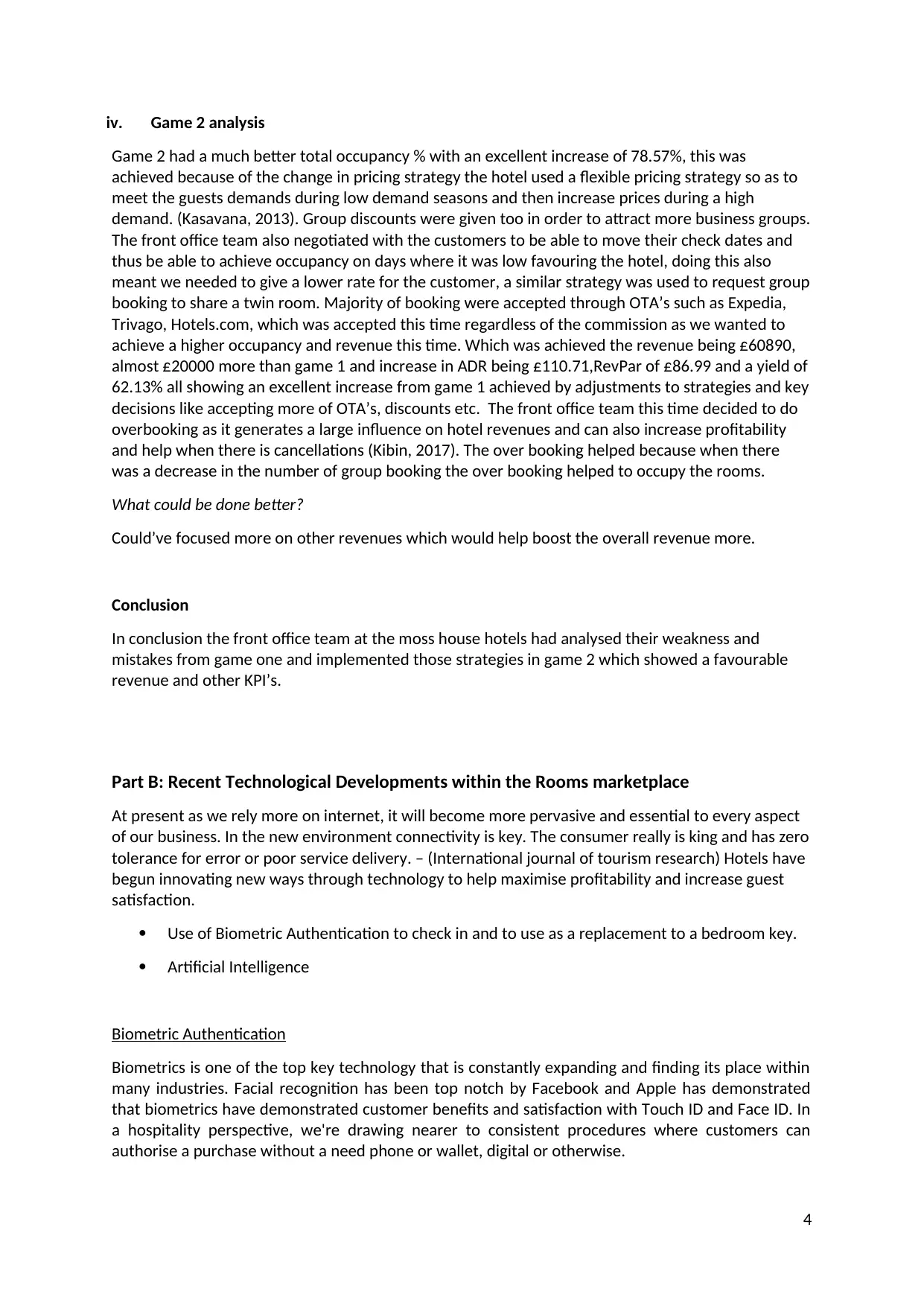
iv. Game 2 analysis
Game 2 had a much better total occupancy % with an excellent increase of 78.57%, this was
achieved because of the change in pricing strategy the hotel used a flexible pricing strategy so as to
meet the guests demands during low demand seasons and then increase prices during a high
demand. (Kasavana, 2013). Group discounts were given too in order to attract more business groups.
The front office team also negotiated with the customers to be able to move their check dates and
thus be able to achieve occupancy on days where it was low favouring the hotel, doing this also
meant we needed to give a lower rate for the customer, a similar strategy was used to request group
booking to share a twin room. Majority of booking were accepted through OTA’s such as Expedia,
Trivago, Hotels.com, which was accepted this time regardless of the commission as we wanted to
achieve a higher occupancy and revenue this time. Which was achieved the revenue being £60890,
almost £20000 more than game 1 and increase in ADR being £110.71,RevPar of £86.99 and a yield of
62.13% all showing an excellent increase from game 1 achieved by adjustments to strategies and key
decisions like accepting more of OTA’s, discounts etc. The front office team this time decided to do
overbooking as it generates a large influence on hotel revenues and can also increase profitability
and help when there is cancellations (Kibin, 2017). The over booking helped because when there
was a decrease in the number of group booking the over booking helped to occupy the rooms.
What could be done better?
Could’ve focused more on other revenues which would help boost the overall revenue more.
Conclusion
In conclusion the front office team at the moss house hotels had analysed their weakness and
mistakes from game one and implemented those strategies in game 2 which showed a favourable
revenue and other KPI’s.
Part B: Recent Technological Developments within the Rooms marketplace
At present as we rely more on internet, it will become more pervasive and essential to every aspect
of our business. In the new environment connectivity is key. The consumer really is king and has zero
tolerance for error or poor service delivery. – (International journal of tourism research) Hotels have
begun innovating new ways through technology to help maximise profitability and increase guest
satisfaction.
Use of Biometric Authentication to check in and to use as a replacement to a bedroom key.
Artificial Intelligence
Biometric Authentication
Biometrics is one of the top key technology that is constantly expanding and finding its place within
many industries. Facial recognition has been top notch by Facebook and Apple has demonstrated
that biometrics have demonstrated customer benefits and satisfaction with Touch ID and Face ID. In
a hospitality perspective, we're drawing nearer to consistent procedures where customers can
authorise a purchase without a need phone or wallet, digital or otherwise.
4
Game 2 had a much better total occupancy % with an excellent increase of 78.57%, this was
achieved because of the change in pricing strategy the hotel used a flexible pricing strategy so as to
meet the guests demands during low demand seasons and then increase prices during a high
demand. (Kasavana, 2013). Group discounts were given too in order to attract more business groups.
The front office team also negotiated with the customers to be able to move their check dates and
thus be able to achieve occupancy on days where it was low favouring the hotel, doing this also
meant we needed to give a lower rate for the customer, a similar strategy was used to request group
booking to share a twin room. Majority of booking were accepted through OTA’s such as Expedia,
Trivago, Hotels.com, which was accepted this time regardless of the commission as we wanted to
achieve a higher occupancy and revenue this time. Which was achieved the revenue being £60890,
almost £20000 more than game 1 and increase in ADR being £110.71,RevPar of £86.99 and a yield of
62.13% all showing an excellent increase from game 1 achieved by adjustments to strategies and key
decisions like accepting more of OTA’s, discounts etc. The front office team this time decided to do
overbooking as it generates a large influence on hotel revenues and can also increase profitability
and help when there is cancellations (Kibin, 2017). The over booking helped because when there
was a decrease in the number of group booking the over booking helped to occupy the rooms.
What could be done better?
Could’ve focused more on other revenues which would help boost the overall revenue more.
Conclusion
In conclusion the front office team at the moss house hotels had analysed their weakness and
mistakes from game one and implemented those strategies in game 2 which showed a favourable
revenue and other KPI’s.
Part B: Recent Technological Developments within the Rooms marketplace
At present as we rely more on internet, it will become more pervasive and essential to every aspect
of our business. In the new environment connectivity is key. The consumer really is king and has zero
tolerance for error or poor service delivery. – (International journal of tourism research) Hotels have
begun innovating new ways through technology to help maximise profitability and increase guest
satisfaction.
Use of Biometric Authentication to check in and to use as a replacement to a bedroom key.
Artificial Intelligence
Biometric Authentication
Biometrics is one of the top key technology that is constantly expanding and finding its place within
many industries. Facial recognition has been top notch by Facebook and Apple has demonstrated
that biometrics have demonstrated customer benefits and satisfaction with Touch ID and Face ID. In
a hospitality perspective, we're drawing nearer to consistent procedures where customers can
authorise a purchase without a need phone or wallet, digital or otherwise.
4
Secure Best Marks with AI Grader
Need help grading? Try our AI Grader for instant feedback on your assignments.
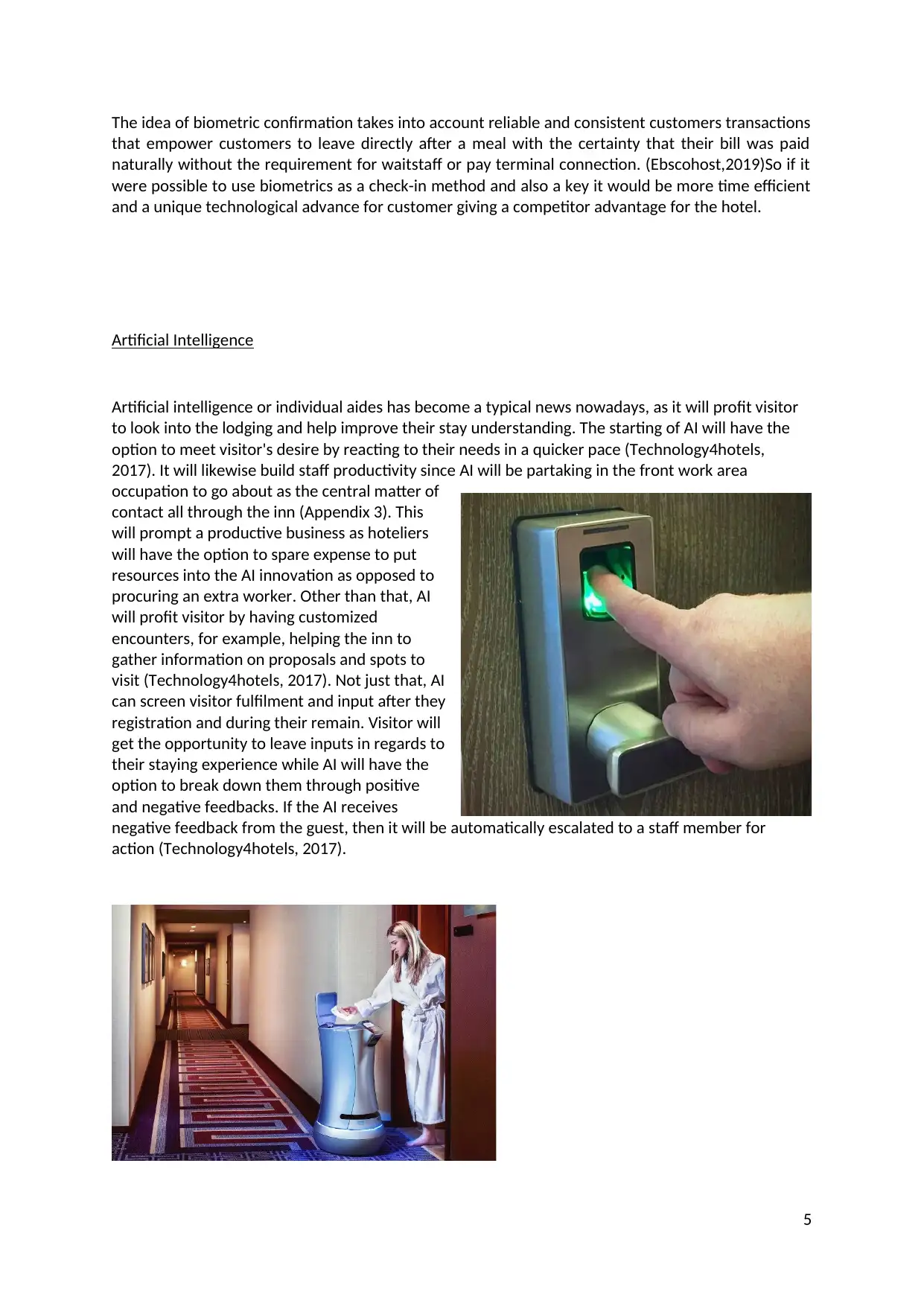
The idea of biometric confirmation takes into account reliable and consistent customers transactions
that empower customers to leave directly after a meal with the certainty that their bill was paid
naturally without the requirement for waitstaff or pay terminal connection. (Ebscohost,2019)So if it
were possible to use biometrics as a check-in method and also a key it would be more time efficient
and a unique technological advance for customer giving a competitor advantage for the hotel.
Artificial Intelligence
Artificial intelligence or individual aides has become a typical news nowadays, as it will profit visitor
to look into the lodging and help improve their stay understanding. The starting of AI will have the
option to meet visitor's desire by reacting to their needs in a quicker pace (Technology4hotels,
2017). It will likewise build staff productivity since AI will be partaking in the front work area
occupation to go about as the central matter of
contact all through the inn (Appendix 3). This
will prompt a productive business as hoteliers
will have the option to spare expense to put
resources into the AI innovation as opposed to
procuring an extra worker. Other than that, AI
will profit visitor by having customized
encounters, for example, helping the inn to
gather information on proposals and spots to
visit (Technology4hotels, 2017). Not just that, AI
can screen visitor fulfilment and input after they
registration and during their remain. Visitor will
get the opportunity to leave inputs in regards to
their staying experience while AI will have the
option to break down them through positive
and negative feedbacks. If the AI receives
negative feedback from the guest, then it will be automatically escalated to a staff member for
action (Technology4hotels, 2017).
5
that empower customers to leave directly after a meal with the certainty that their bill was paid
naturally without the requirement for waitstaff or pay terminal connection. (Ebscohost,2019)So if it
were possible to use biometrics as a check-in method and also a key it would be more time efficient
and a unique technological advance for customer giving a competitor advantage for the hotel.
Artificial Intelligence
Artificial intelligence or individual aides has become a typical news nowadays, as it will profit visitor
to look into the lodging and help improve their stay understanding. The starting of AI will have the
option to meet visitor's desire by reacting to their needs in a quicker pace (Technology4hotels,
2017). It will likewise build staff productivity since AI will be partaking in the front work area
occupation to go about as the central matter of
contact all through the inn (Appendix 3). This
will prompt a productive business as hoteliers
will have the option to spare expense to put
resources into the AI innovation as opposed to
procuring an extra worker. Other than that, AI
will profit visitor by having customized
encounters, for example, helping the inn to
gather information on proposals and spots to
visit (Technology4hotels, 2017). Not just that, AI
can screen visitor fulfilment and input after they
registration and during their remain. Visitor will
get the opportunity to leave inputs in regards to
their staying experience while AI will have the
option to break down them through positive
and negative feedbacks. If the AI receives
negative feedback from the guest, then it will be automatically escalated to a staff member for
action (Technology4hotels, 2017).
5
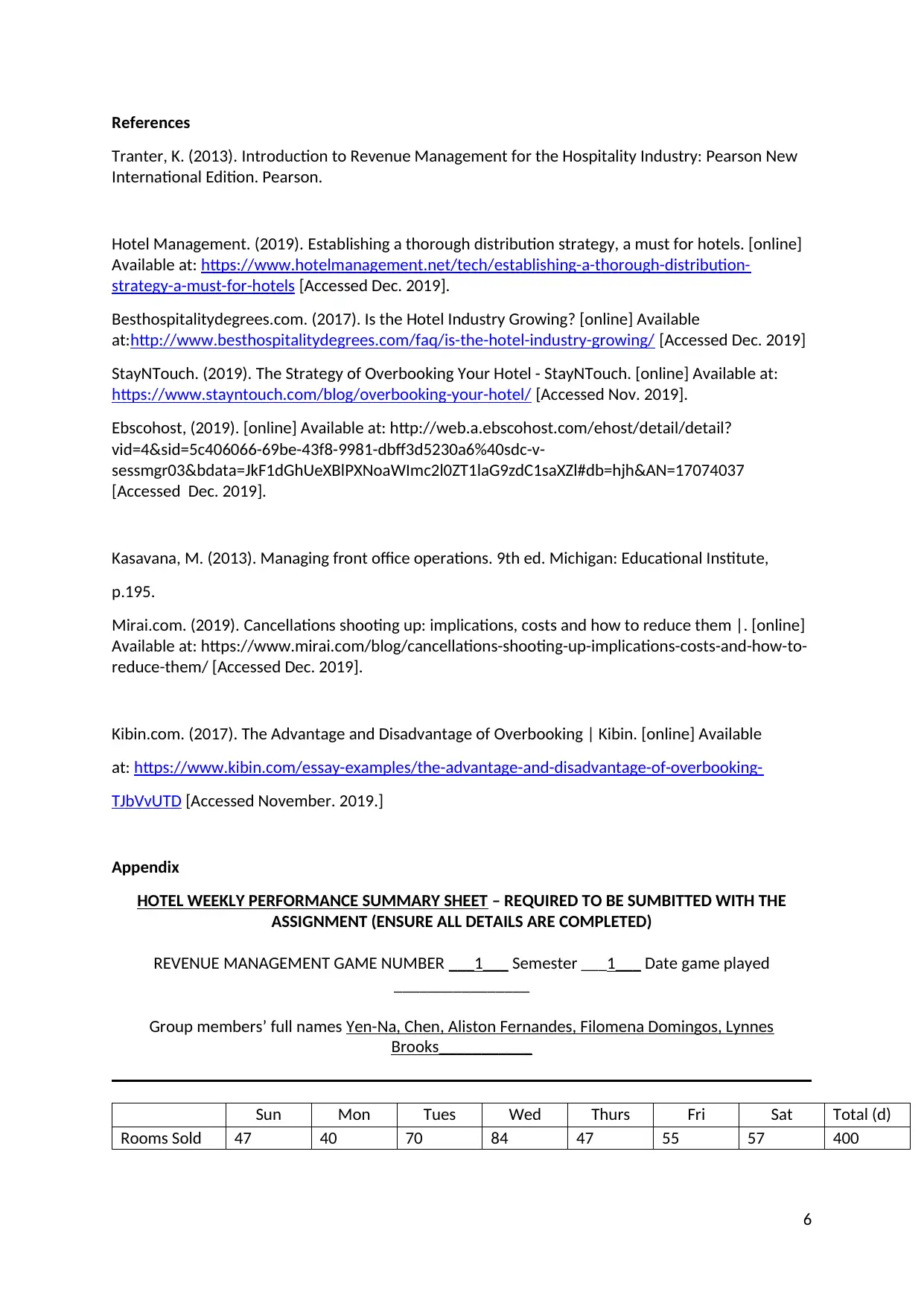
References
Tranter, K. (2013). Introduction to Revenue Management for the Hospitality Industry: Pearson New
International Edition. Pearson.
Hotel Management. (2019). Establishing a thorough distribution strategy, a must for hotels. [online]
Available at: https://www.hotelmanagement.net/tech/establishing-a-thorough-distribution-
strategy-a-must-for-hotels [Accessed Dec. 2019].
Besthospitalitydegrees.com. (2017). Is the Hotel Industry Growing? [online] Available
at:http://www.besthospitalitydegrees.com/faq/is-the-hotel-industry-growing/ [Accessed Dec. 2019]
StayNTouch. (2019). The Strategy of Overbooking Your Hotel - StayNTouch. [online] Available at:
https://www.stayntouch.com/blog/overbooking-your-hotel/ [Accessed Nov. 2019].
Ebscohost, (2019). [online] Available at: http://web.a.ebscohost.com/ehost/detail/detail?
vid=4&sid=5c406066-69be-43f8-9981-dbff3d5230a6%40sdc-v-
sessmgr03&bdata=JkF1dGhUeXBlPXNoaWImc2l0ZT1laG9zdC1saXZl#db=hjh&AN=17074037
[Accessed Dec. 2019].
Kasavana, M. (2013). Managing front office operations. 9th ed. Michigan: Educational Institute,
p.195.
Mirai.com. (2019). Cancellations shooting up: implications, costs and how to reduce them |. [online]
Available at: https://www.mirai.com/blog/cancellations-shooting-up-implications-costs-and-how-to-
reduce-them/ [Accessed Dec. 2019].
Kibin.com. (2017). The Advantage and Disadvantage of Overbooking | Kibin. [online] Available
at: https://www.kibin.com/essay-examples/the-advantage-and-disadvantage-of-overbooking-
TJbVvUTD [Accessed November. 2019.]
Appendix
HOTEL WEEKLY PERFORMANCE SUMMARY SHEET – REQUIRED TO BE SUMBITTED WITH THE
ASSIGNMENT (ENSURE ALL DETAILS ARE COMPLETED)
REVENUE MANAGEMENT GAME NUMBER ___1___ Semester ___1___ Date game played
________________
Group members’ full names Yen-Na, Chen, Aliston Fernandes, Filomena Domingos, Lynnes
Brooks___________
Sun Mon Tues Wed Thurs Fri Sat Total (d)
Rooms Sold 47 40 70 84 47 55 57 400
6
Tranter, K. (2013). Introduction to Revenue Management for the Hospitality Industry: Pearson New
International Edition. Pearson.
Hotel Management. (2019). Establishing a thorough distribution strategy, a must for hotels. [online]
Available at: https://www.hotelmanagement.net/tech/establishing-a-thorough-distribution-
strategy-a-must-for-hotels [Accessed Dec. 2019].
Besthospitalitydegrees.com. (2017). Is the Hotel Industry Growing? [online] Available
at:http://www.besthospitalitydegrees.com/faq/is-the-hotel-industry-growing/ [Accessed Dec. 2019]
StayNTouch. (2019). The Strategy of Overbooking Your Hotel - StayNTouch. [online] Available at:
https://www.stayntouch.com/blog/overbooking-your-hotel/ [Accessed Nov. 2019].
Ebscohost, (2019). [online] Available at: http://web.a.ebscohost.com/ehost/detail/detail?
vid=4&sid=5c406066-69be-43f8-9981-dbff3d5230a6%40sdc-v-
sessmgr03&bdata=JkF1dGhUeXBlPXNoaWImc2l0ZT1laG9zdC1saXZl#db=hjh&AN=17074037
[Accessed Dec. 2019].
Kasavana, M. (2013). Managing front office operations. 9th ed. Michigan: Educational Institute,
p.195.
Mirai.com. (2019). Cancellations shooting up: implications, costs and how to reduce them |. [online]
Available at: https://www.mirai.com/blog/cancellations-shooting-up-implications-costs-and-how-to-
reduce-them/ [Accessed Dec. 2019].
Kibin.com. (2017). The Advantage and Disadvantage of Overbooking | Kibin. [online] Available
at: https://www.kibin.com/essay-examples/the-advantage-and-disadvantage-of-overbooking-
TJbVvUTD [Accessed November. 2019.]
Appendix
HOTEL WEEKLY PERFORMANCE SUMMARY SHEET – REQUIRED TO BE SUMBITTED WITH THE
ASSIGNMENT (ENSURE ALL DETAILS ARE COMPLETED)
REVENUE MANAGEMENT GAME NUMBER ___1___ Semester ___1___ Date game played
________________
Group members’ full names Yen-Na, Chen, Aliston Fernandes, Filomena Domingos, Lynnes
Brooks___________
Sun Mon Tues Wed Thurs Fri Sat Total (d)
Rooms Sold 47 40 70 84 47 55 57 400
6
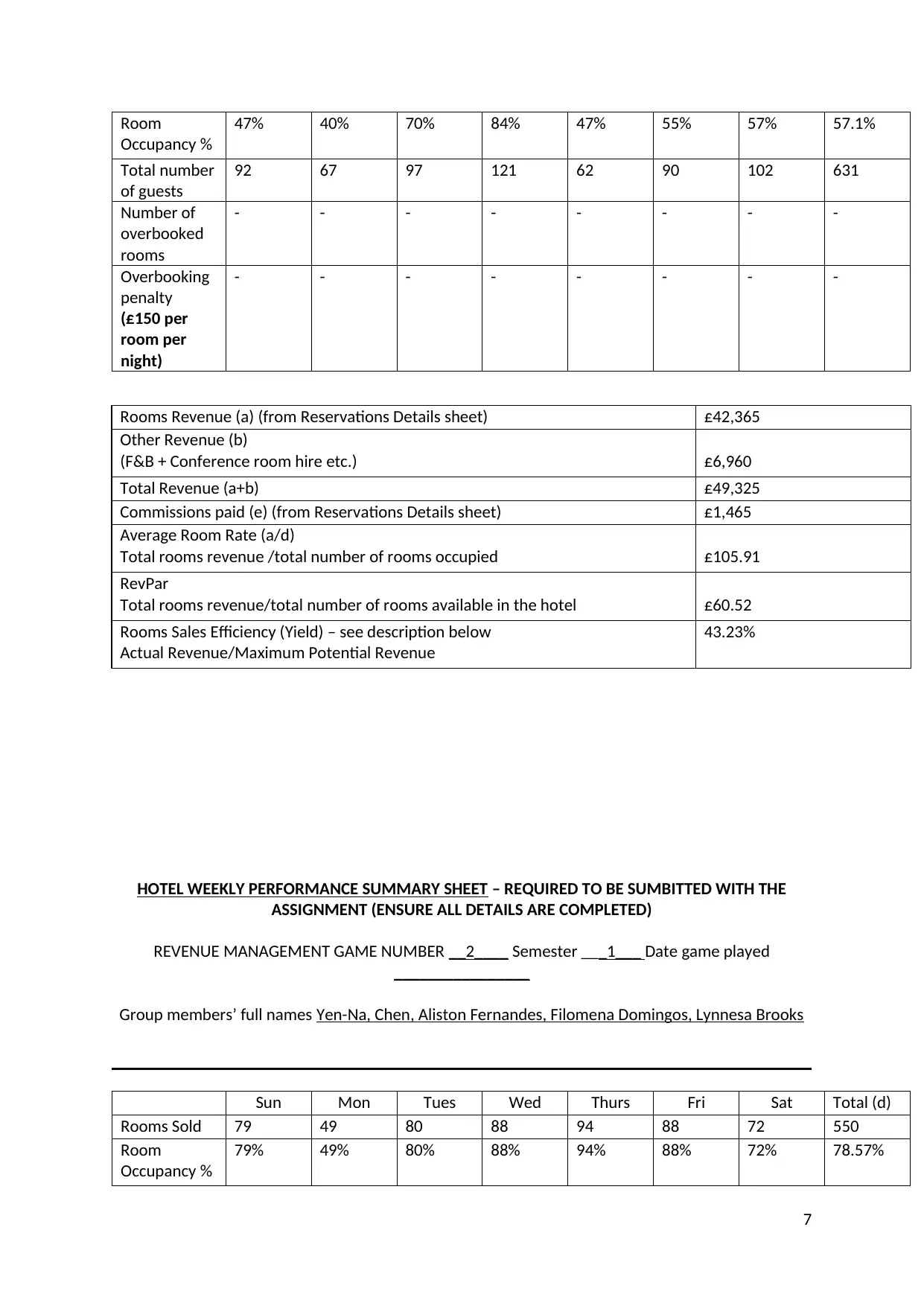
Room
Occupancy %
47% 40% 70% 84% 47% 55% 57% 57.1%
Total number
of guests
92 67 97 121 62 90 102 631
Number of
overbooked
rooms
- - - - - - - -
Overbooking
penalty
(£150 per
room per
night)
- - - - - - - -
Rooms Revenue (a) (from Reservations Details sheet) £42,365
Other Revenue (b)
(F&B + Conference room hire etc.) £6,960
Total Revenue (a+b) £49,325
Commissions paid (e) (from Reservations Details sheet) £1,465
Average Room Rate (a/d)
Total rooms revenue /total number of rooms occupied £105.91
RevPar
Total rooms revenue/total number of rooms available in the hotel £60.52
Rooms Sales Efficiency (Yield) – see description below
Actual Revenue/Maximum Potential Revenue
43.23%
HOTEL WEEKLY PERFORMANCE SUMMARY SHEET – REQUIRED TO BE SUMBITTED WITH THE
ASSIGNMENT (ENSURE ALL DETAILS ARE COMPLETED)
REVENUE MANAGEMENT GAME NUMBER __2____ Semester ___1___ Date game played
________________
Group members’ full names Yen-Na, Chen, Aliston Fernandes, Filomena Domingos, Lynnesa Brooks
Sun Mon Tues Wed Thurs Fri Sat Total (d)
Rooms Sold 79 49 80 88 94 88 72 550
Room
Occupancy %
79% 49% 80% 88% 94% 88% 72% 78.57%
7
Occupancy %
47% 40% 70% 84% 47% 55% 57% 57.1%
Total number
of guests
92 67 97 121 62 90 102 631
Number of
overbooked
rooms
- - - - - - - -
Overbooking
penalty
(£150 per
room per
night)
- - - - - - - -
Rooms Revenue (a) (from Reservations Details sheet) £42,365
Other Revenue (b)
(F&B + Conference room hire etc.) £6,960
Total Revenue (a+b) £49,325
Commissions paid (e) (from Reservations Details sheet) £1,465
Average Room Rate (a/d)
Total rooms revenue /total number of rooms occupied £105.91
RevPar
Total rooms revenue/total number of rooms available in the hotel £60.52
Rooms Sales Efficiency (Yield) – see description below
Actual Revenue/Maximum Potential Revenue
43.23%
HOTEL WEEKLY PERFORMANCE SUMMARY SHEET – REQUIRED TO BE SUMBITTED WITH THE
ASSIGNMENT (ENSURE ALL DETAILS ARE COMPLETED)
REVENUE MANAGEMENT GAME NUMBER __2____ Semester ___1___ Date game played
________________
Group members’ full names Yen-Na, Chen, Aliston Fernandes, Filomena Domingos, Lynnesa Brooks
Sun Mon Tues Wed Thurs Fri Sat Total (d)
Rooms Sold 79 49 80 88 94 88 72 550
Room
Occupancy %
79% 49% 80% 88% 94% 88% 72% 78.57%
7
Paraphrase This Document
Need a fresh take? Get an instant paraphrase of this document with our AI Paraphraser
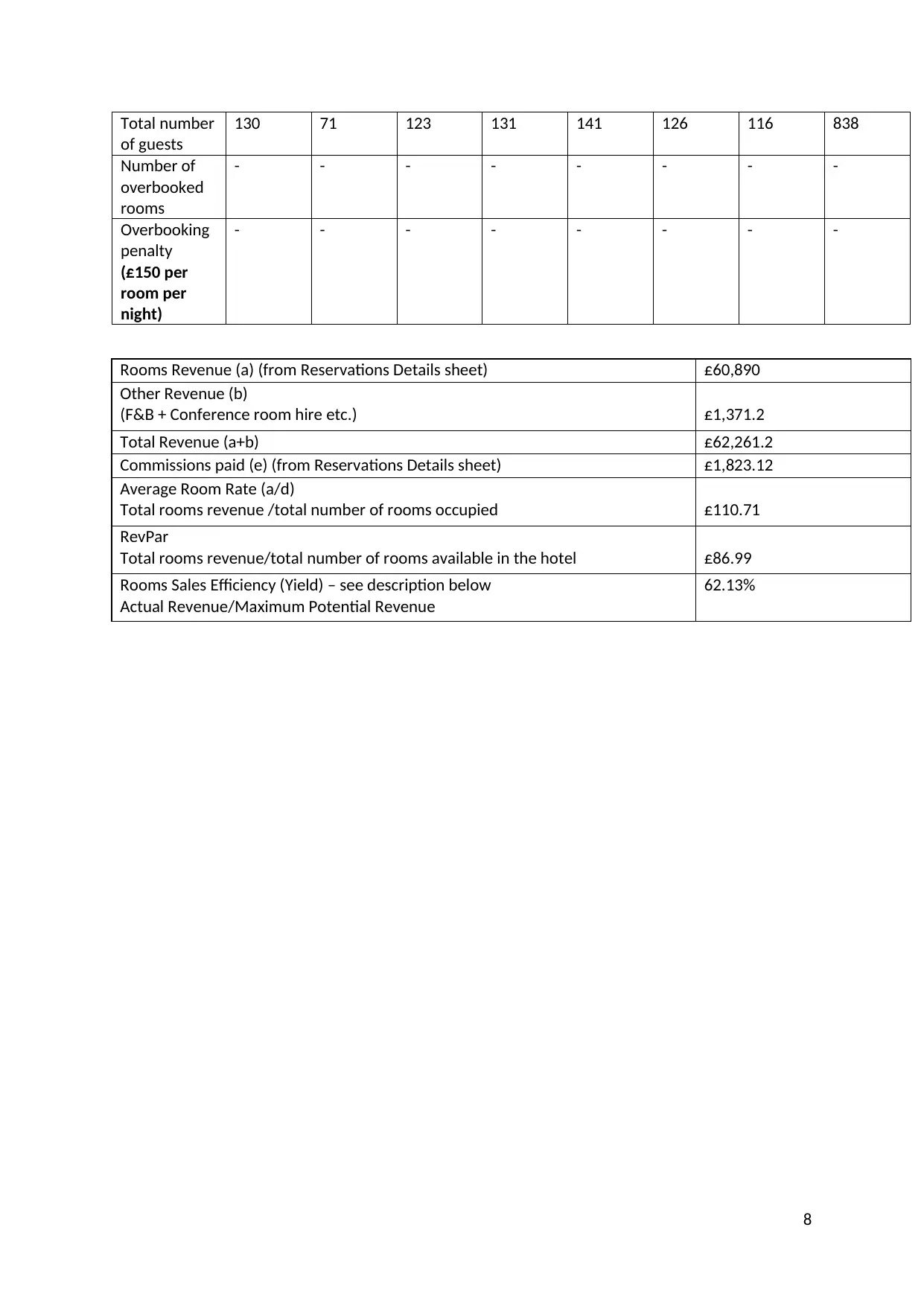
Total number
of guests
130 71 123 131 141 126 116 838
Number of
overbooked
rooms
- - - - - - - -
Overbooking
penalty
(£150 per
room per
night)
- - - - - - - -
Rooms Revenue (a) (from Reservations Details sheet) £60,890
Other Revenue (b)
(F&B + Conference room hire etc.) £1,371.2
Total Revenue (a+b) £62,261.2
Commissions paid (e) (from Reservations Details sheet) £1,823.12
Average Room Rate (a/d)
Total rooms revenue /total number of rooms occupied £110.71
RevPar
Total rooms revenue/total number of rooms available in the hotel £86.99
Rooms Sales Efficiency (Yield) – see description below
Actual Revenue/Maximum Potential Revenue
62.13%
8
of guests
130 71 123 131 141 126 116 838
Number of
overbooked
rooms
- - - - - - - -
Overbooking
penalty
(£150 per
room per
night)
- - - - - - - -
Rooms Revenue (a) (from Reservations Details sheet) £60,890
Other Revenue (b)
(F&B + Conference room hire etc.) £1,371.2
Total Revenue (a+b) £62,261.2
Commissions paid (e) (from Reservations Details sheet) £1,823.12
Average Room Rate (a/d)
Total rooms revenue /total number of rooms occupied £110.71
RevPar
Total rooms revenue/total number of rooms available in the hotel £86.99
Rooms Sales Efficiency (Yield) – see description below
Actual Revenue/Maximum Potential Revenue
62.13%
8
1 out of 8
Related Documents
Your All-in-One AI-Powered Toolkit for Academic Success.
+13062052269
info@desklib.com
Available 24*7 on WhatsApp / Email
![[object Object]](/_next/static/media/star-bottom.7253800d.svg)
Unlock your academic potential
© 2024 | Zucol Services PVT LTD | All rights reserved.





